
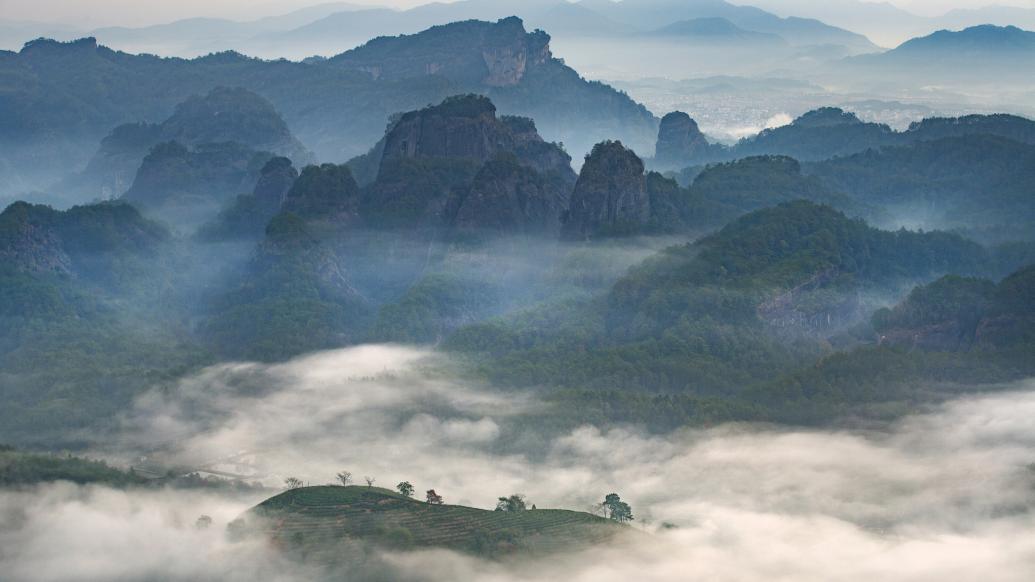
Millennium Confucianism, Buddhism and Taoism, eternal landscape tea.
If you talk about the integration of the three religions culture and the tea culture, Wuyi Mountain is the most beautiful landscape in the world.
Tea is not only material, but also spiritual. Since the Tang and Song dynasties, the literati of all dynasties have continued to love tea, visiting tea mountains, looking for tea, remembering tea events, drawing pictures of tea, and expressing their elegant feelings. Among the mountains and wild bamboo forests, beside the strange stones of pine and bamboo, one may chat with Ke Qing, or explore the mysteries and participate in good fortune. The participation of literati and refined scholars makes tea transform from a natural tea to a spiritual carrier containing culture and emotion.
Throughout the history of tea, it can be said that it is the evolution history of Chinese life aesthetics, and it is also a history of art. The "Poetry and Painting Asking Tea" series launched by "The Paper·Ancient Art" starts from the tea-picking scene, the art of poetry and painting, and the aesthetics of utensils, etc., to find the Chinese literati and refined scholars entrusted with a cup of tea, and to pursue Chinese tea culture. beauty of. This issue is Wuyi Mountain, where you can explore the fragrance of rock bones and flowers of "Dahongpao" in the Bishuidan Mountain.
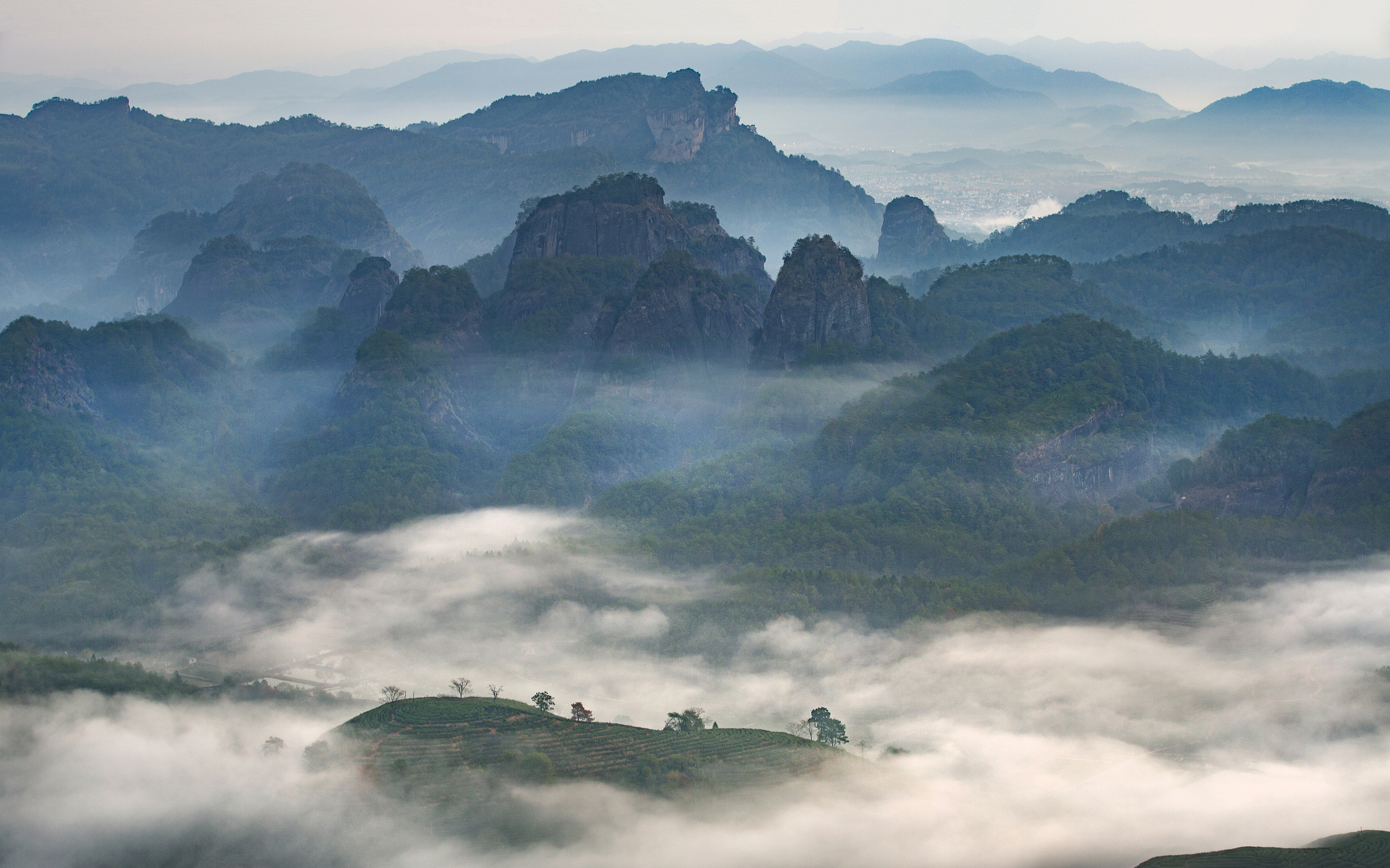
Wuyi landscape
The rock is the bone, and the stream is the spirit. Wuyi Mountain originated from the rocks of the Cretaceous period. After hundreds of millions of years of geological movement and natural craftsmanship, it transformed into a clear water Danshan Mountain composed of volcanic conglomerate, red conglomerate and shale. Thirty-six peaks, ninety-nine rocks, and Jiuqu stream meander among them. Since the Qin and Han Dynasties, the wonderful natural scenery has made Wuyi Mountain a retreat for Yuliu Shizi; In the southeast, literati and refined scholars visit Shangyong, adding color to the mountains and rivers, and leaving the cultural relic of "Cliff Stone Carvings" on the banks of the Jiuqu River.
As the birthplace of black tea and oolong tea in the world and the starting point of the "Ten Thousand Miles Tea Ceremony", Wuyi Mountain is also a well-deserved hometown of tea culture and art. Natural selection, time precipitation, the most suitable unique fertile soil for the growth of Wuyi rock tea, also created the outstanding style of rock tea with a strong character. Either flexible and delicate, or thick and sweet, sip it in a small cup, as if you have tasted all the leaves and mountains of Wuyi.
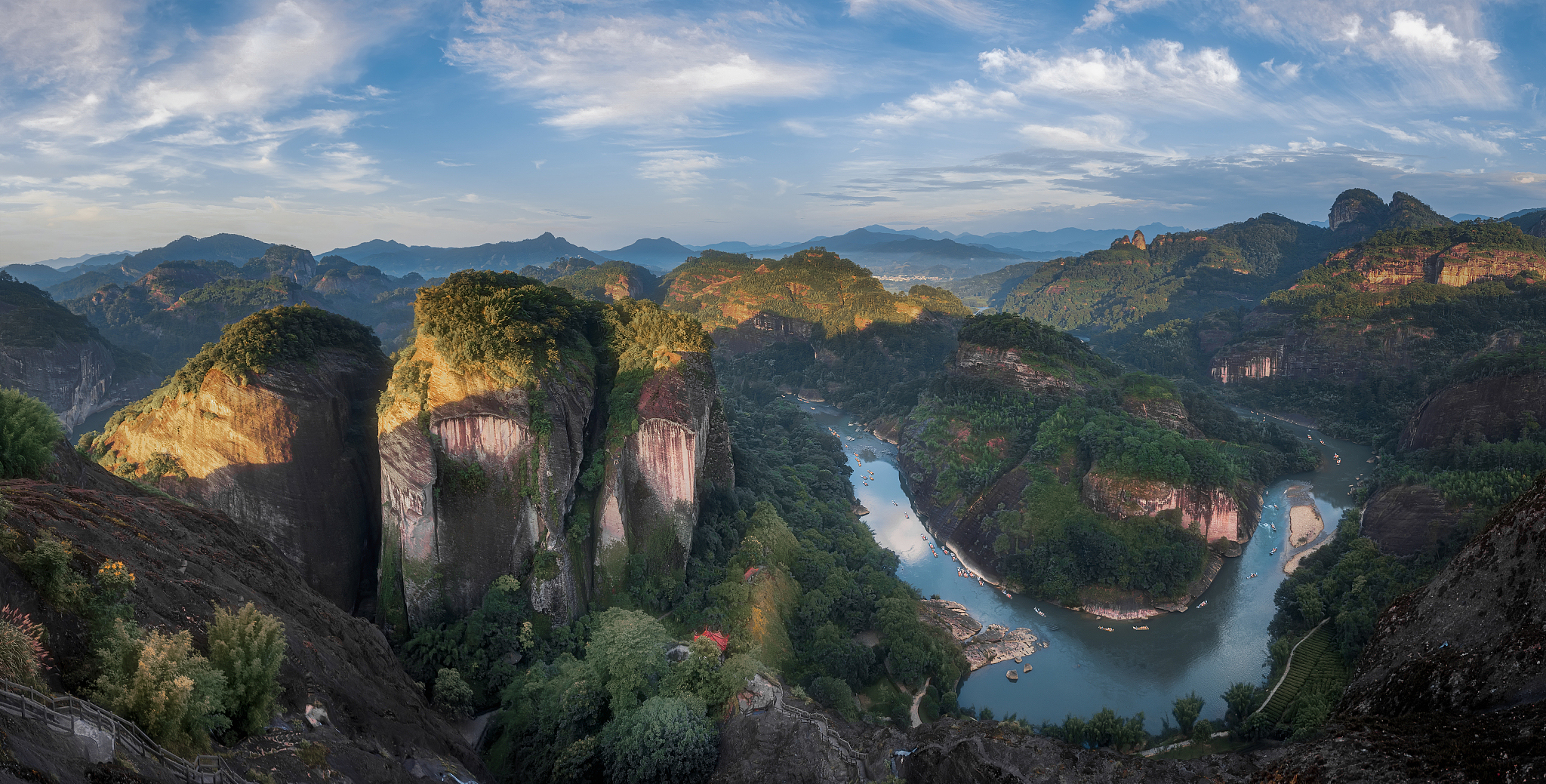
Wuyi landscape
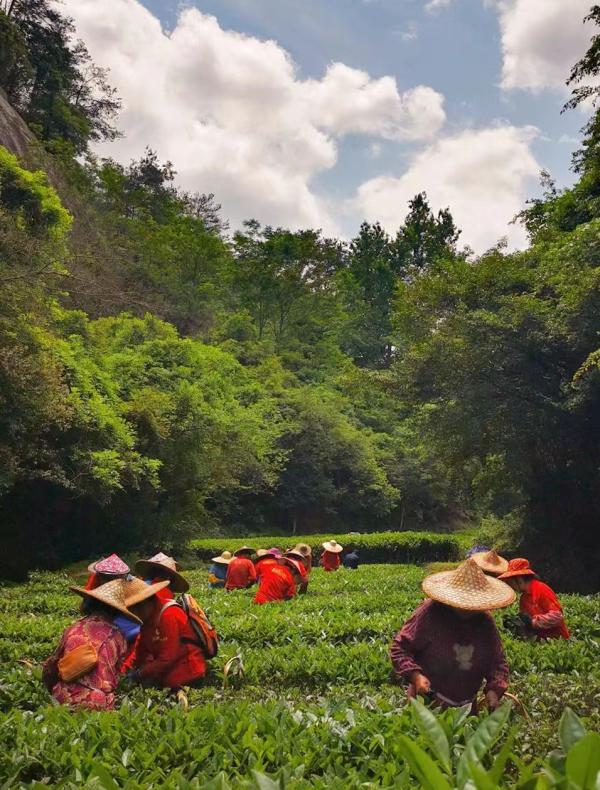
Wuyi Mountain Tea Farm, photo courtesy of Wuyi Star
Shouting to the Mountain, originated from the Wuyi Tea Ceremony in Tang and Song Dynasties
"Let's open the mountain! Pick tea!"
With the tea growers shouting loudly and long, it means that the spring tea season of Wuyi rock tea is officially coming.
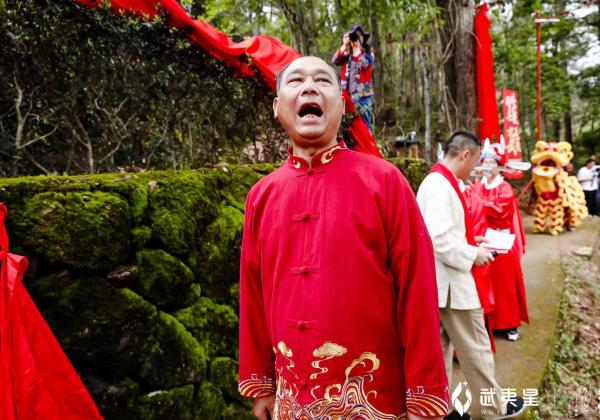
Tea people shouting at the mountain, photo provided by Wuyi Xing
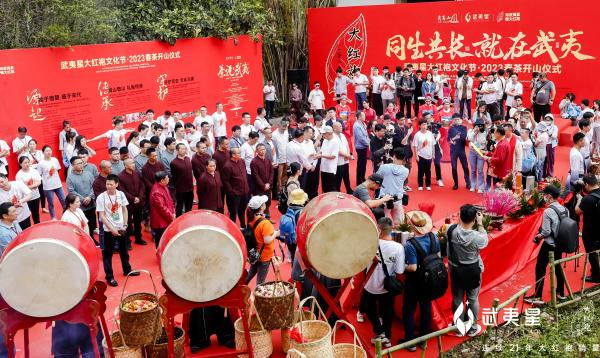
Wuyi Star Dahongpao Cultural Festival · 2023 Spring Tea Opening Ceremony
The "Mountain Opening Ceremony" is held every year during the Grain Rain season, and the etiquette system is solemn and serious. In Guyu this year, The Paper reporters came to the royal tea garden site "Yu Tea Garden" in the south of Siqu River in Wuyi Mountain. During the opening ceremony of the Wuyi Star Dahongpao Cultural Festival, they followed the tea farmers to the tea trees in the middle of the mountain. The experience has lasted for several years. The centuries-old folk custom of Wuyi Mountain. Light incense and candles, pay homage, read sacrificial texts, and provide three animals, wine and food, etc. At the end of the sacrifice, the sound of gold and drums, and the sound of firecrackers. The officiant led all the tea pickers in the audience to shout "Creating the mountain! Tea picking!" The sound spread across the valley, echoing endlessly.
He Yixin, the honorary president of the China Tea Industry Circulation Association and the person in charge of Wuyi Star Tea Industry, introduced to The Paper that "Shouting Mountain" began in the Tang Dynasty and flourished in the Song Dynasty. Wuyi Mountain folklore.
In "Tasting New Tea and Presenting the Holy Yu" written by Ouyang Xiu in the Northern Song Dynasty, it is recorded that the scene of shouting at the mountain at that time: " The spring is about to move at the end of the year, and the thunder has not risen to drive away the dragon and snake. At night, I heard drums beating all over the valley, and thousands of people shouted for help. Ah, Wan Muhan is sleepy and can't wake up, but this tree sprouts first. It is known that this is the most spiritual thing, and it is suitable for it to uniquely obtain the essence of heaven and earth. "
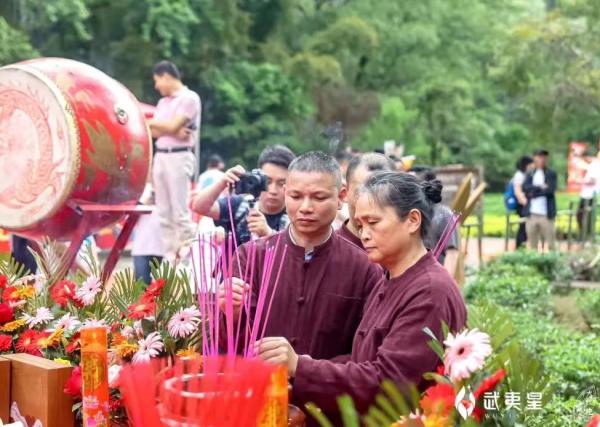
Tea people worship to pray for smooth production of tea this year, photo provided by Wuyixing
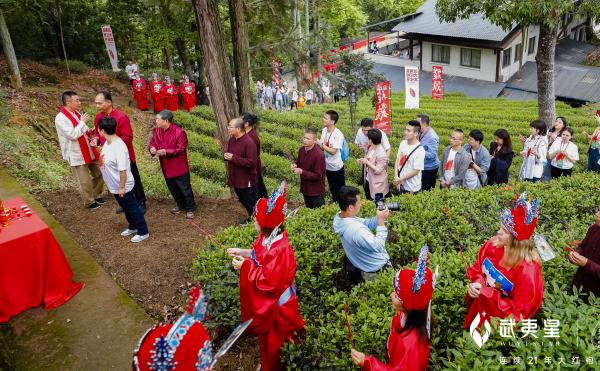
Tea people worship the mountain
In the Yuan Dynasty, Wuyi tea was favored by Kublai Khan, the ancestor of the Yuan Dynasty, and the officials of the court, and was designated as a tribute by the Yuan court. The ceremony of worshiping the gods of tea was adopted by the officials in Wuyi Mountain, and the custom of calling out to the mountain has also officially become a kind of sacrifice in the imperial tea garden, and the local tea people attach great importance to it.
"Sacrifice is not only to pray for a good harvest, but also represents the awe of nature by Wuyi Mountain tea people. We restarted the ceremony of shouting to the mountain more than 20 years ago, which is a cultural component of Wuyi Rock Tea. 'Respect the sky and the earth, grow together' , It is the gestation of the sandstone soil in Wuyi Mountain and the infiltration of the Jiuqu stream that make such good tea." He Yixin introduced that more and more tea farmers and tea factories have also started the custom of calling the mountain.
Wuyi Mountain is famous for its Danxia landform, with gigantic rock walls standing between each other, valleys interspersed with streams and streams. Due to the convenience of the situation, tea farmers used rock recesses, rock crevices, and rock crevices to build stone banks along the edge to plant tea trees. "There is tea in rocks, but there is no tea in non-rocks", which has become another way of saying that "rock tea" gets its name.
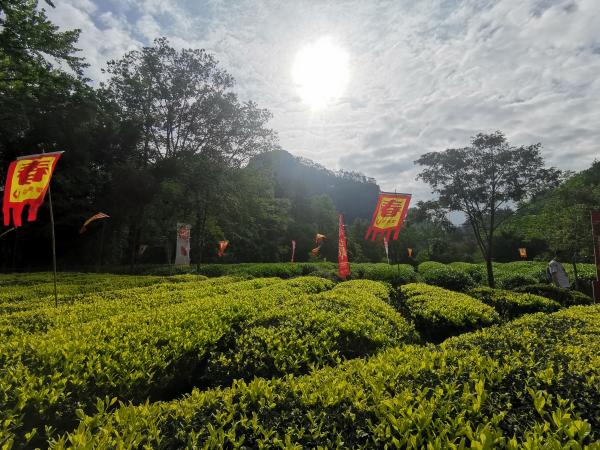
In the Imperial Tea Garden of Wuyi Mountain
Lu Tingcan, an magistrate of Chong’an County in the Qing Dynasty, commented in "Continued Tea Classics Tea Origin": " Teas can be grown in Wuyi Mountain for a hundred or twenty miles around... The ones in the mountains are rock tea, which is the top grade; the local ones are Chau tea, which is second. "Among the peaks, rocks and gullies of Wuyi Mountain, there are hundreds of different mountain farms scattered. There are the well-known "three pits, two ravines and one nest" (Huiyuankeng, Niulankeng, Dakengkou, Liuxiangjian, Wuyuanjian, Jiulongke), as well as the familiar "Thirty-six Peaks" and "Ninety-nine Rocks". Each mountain farm produces different charms due to different soils, environments, and climates, and the tea leaves in each mountain farm have their own distinct and unique flavors.
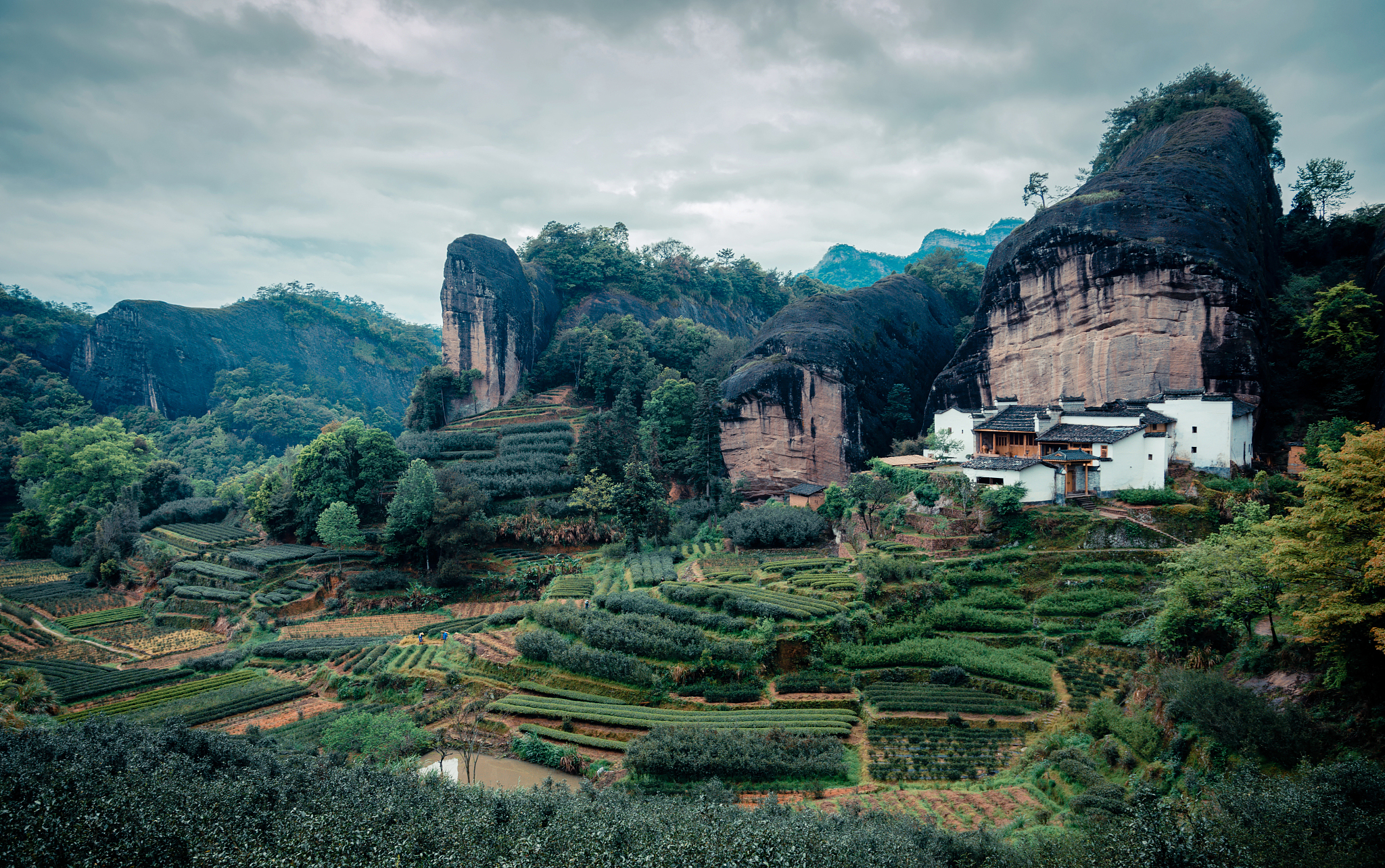
Wuyi Mountain Tea Farm
Walking slowly in the rocky valleys, you can see that there are often seepage streams on the rock walls, gurgling springs in roadside ditches, wild vines and green vines hanging down, and the faint fragrance of moss and wild orchids. " This kind of tea grows from stone cracks, and it has a special name of golden buds and pearls. It can't be sunburned by rain, but a few celestial grasses are empty and clear." It can be seen that what Yuan Mei said in the poem "the man who solves the problem in tea" is true .
People in the world often use "rock bone flower fragrance" to describe the taste of high-quality rock tea, and there is also a large-character stone carving of "rock rhyme" on the rock wall of Jiulongke. What exactly is "rock rhyme"?
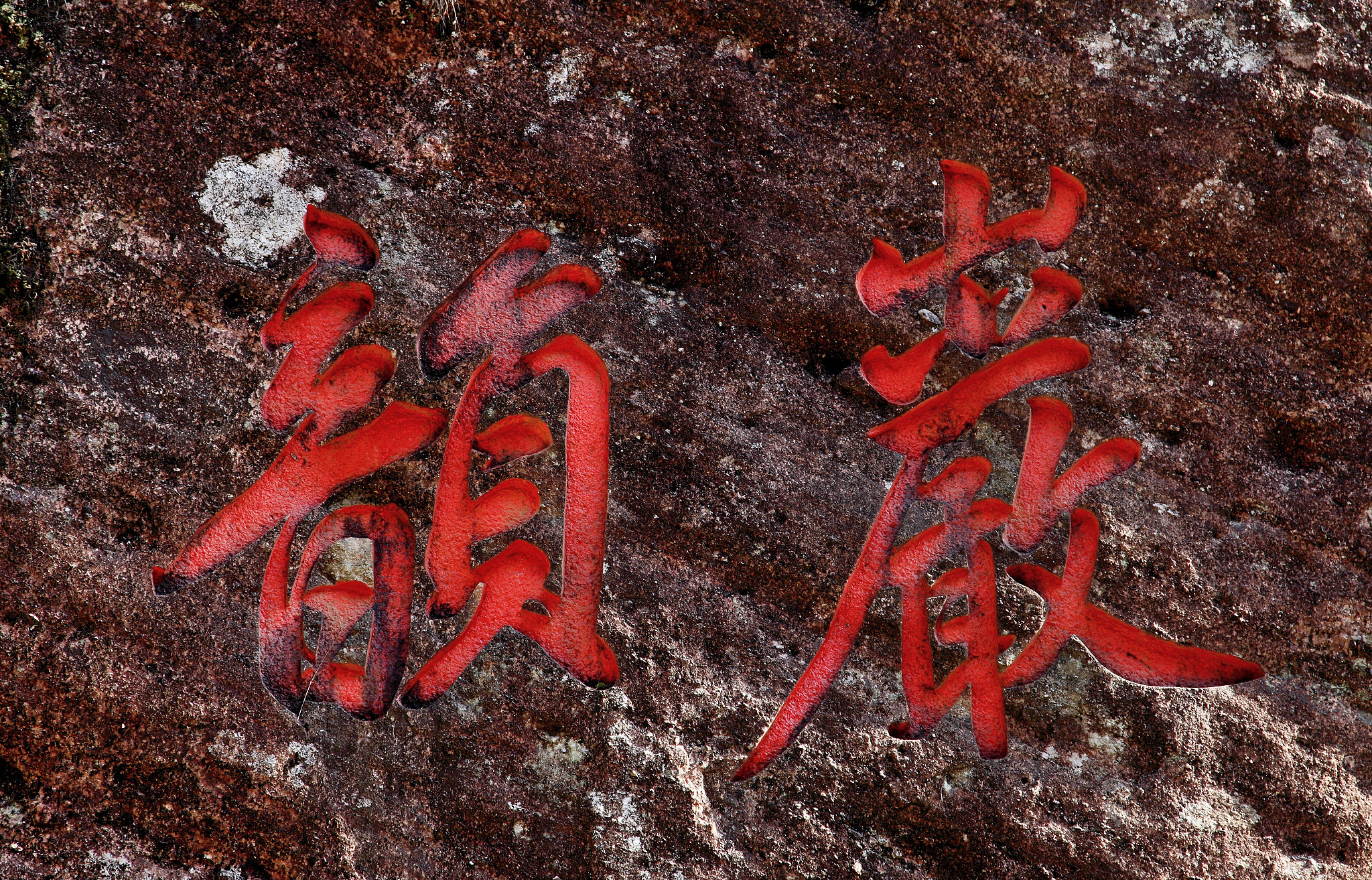
Cliff stone carvings "Rock Rhyme"
The word "rock bone" was first seen in Su Dongpo's poem "He Qian'an Daohui Jijian Tea", which praised " the beauty is so cute, the bones are clear and the meat is greasy and upright ". The charm of tea mainly refers to the sensory experience brought by the tea soup after entering the throat. The top-quality tea leaves a fragrance on the teeth and cheeks and a long aftertaste. Just because the flavor of tea varies greatly with different landforms, the rich landform environment determines the innate quality of Wuyi rock tea.
Pit, gorge, nest, cave, rock, hillock, nest... Different mountain farms naturally bring different flavors: some are flexible and delicate, some are rich and sharp, some are mellow and elegant. When Emperor Qianlong of the Qing Dynasty commented on Wuyi tribute tea, he wrote a poem chanting that "Wuyi is the best product in China, with a clean smell and a bone-like taste", which is actually a kind of "rock rhyme".
Immortals in Wuyi have been planted since ancient times, and books carved on cliffs and stones are romantic
There is no definite record as to when tea was grown and drunk in Mount Wuyi. According to the research of Mr. Chen Chuan, a contemporary tea expert, Wuyi tea can even be traced back to the Northern and Southern Dynasties.
Wuyi tea (belonging to the "green tea" category) has been matured in the Tang Dynasty, and it was first seen in written records in "Send Tea and Jiao Xing Bushu" by Sun Qiao, a writer in the late Tang Dynasty. When Sun Qiao passed Wuyi Mountain, local officials treated him with Wuyi tea, and Sun Qiao was full of praise after drinking the tea. After returning to Beijing, Sun Qiao shared this tea with his friends who worked in the Ministry of Punishment, and attached a book "Sending Tea and the Ministry of Scoring and Punishment" with the tea: " Fifteen people from the Marquis of Gan in the late Gan Dynasty were sent to the Zhai Pavilion. Pick it up, worship the water and make peace. Build the hometown of Danshan and clear water in Jianyang, and the products of the moon stream and cloud niches, please do not use them cheaply ."
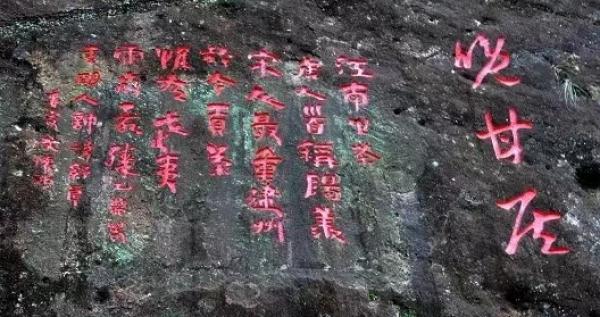
"Late Ganhou" Stone Carving
Because of the unique sweetness of Wuyi tea, Sun Qiao called Wuyi tea "Late Gan Hou" in an anthropomorphic way. "Danshan and clear water" comes from Jiang Yan, a literati in the Southern Dynasties, who praised Wuyi Mountain.
Since then, "Late Ganhou" has also become another name for Wuyi tea. Later generations also collected the calligraphy of calligrapher Wang Xizhi, and engraved the three-character inscription "Late Ganhou" on the rock wall of Jiulongcao in Wuyi Mountain.
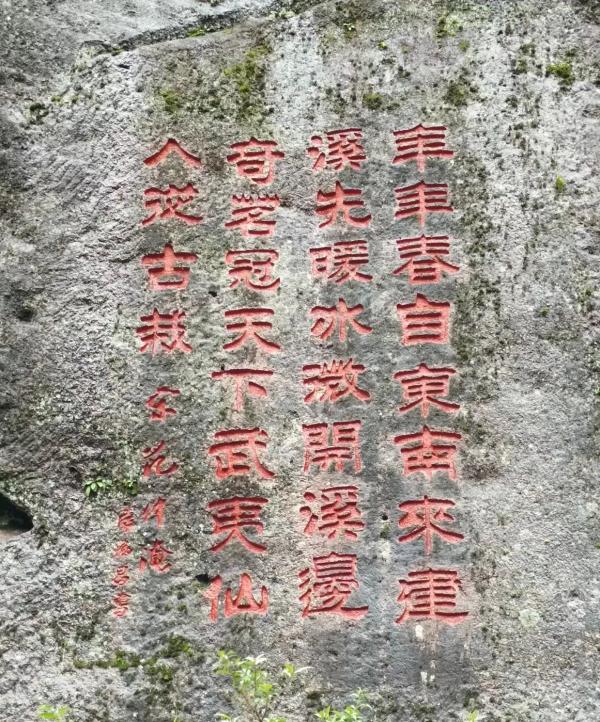
A stone carving of Fan Zhongyan's "Tea Fighting Song with Zhang Min"
Next to the stone inscription "Late Ganhou", there are the first four lines of the stone inscription "Engaged in Tea Fighting Song with Zhang Min" written by Fan Zhongyan, a master of the Song Dynasty:
Every year spring comes from the southeast, Jianxi first warms the ice and opens slightly.
The strange tea by the stream is the best in the world, and it has been planted by Wuyi immortals since ancient times.
"Immortals have been recorded since ancient times" is certainly a literary exaggeration, but it also points out the legend of Wuyi Mountain and the delicacy of tea.
Similar to this poem, there is also "Tea Stove" written by Confucianist Zhu Xi:
The stone stove left by the fairy is in the middle of the water.
After drinking, go to the ark, and the tea smoke is fragrant.
In the tenth year of Chunxi's reign (1183), Zhu Xi built Wuyi Jingshe at the foot of Wuqu Yinping Peak in Wuyi Mountain, where he gave lectures to apprentices. In his Preface to Wuyi Jingshe Miscellaneous Poems, he mentioned that there is a place in Wuqu Liushui that "a giant stone stands tall and can sit around eight or nine people. There are deep waters on all sides, and the set pattern in the middle is naturally like a stove", so he named the huge stone "tea stove". ".
Attaching love to mountains and rivers and learning from nature was an integral part of the life of ancient Chinese scholar-bureaucrats, and the spirit of mountains and rivers was also fused into their cultural blood. "Qinshu for forty years, a few times as a guest in the mountains", Zhu Xi spent half of his life in Wuyi Mountain. Throughout his experience, there are many ups and downs and helplessness. The halo of the so-called Confucian masters is also the glory behind him. A piece of stone in the water can make Zhu Xi think about the remains of the ancient immortal, so that future generations can also feel the free spirit of a generation of masters.
When talking about tea in Fujian, we must mention Cai Xiang, a famous official and calligrapher in the Northern Song Dynasty. Cai Xiang was born in Xianyou, Xinghua, Fujian (now Xianyou, Putian), and was good at tea affairs. When Cai Xiang replaced Prime Minister Ding Wei as Fujian's transshipment envoy, he improved Beiyuan tribute tea, reduced spices, used fresher tea leaves, irrigated spring water, and adjusted the process. ".
Ouyang Xiu recorded this matter in "Return to the Field": "The quality of tea is more expensive than dragon and phoenix, which is called Tuancha. Every eight cakes weighs a catty. Cai Junmo was a transshipment envoy in Fujian during the Qing calendar, and he began to make small pieces of dragon tea. The quality is exquisite, which is called a small group. Every twenty cakes weighs one catty, and its value is two taels of gold. "
There were dozens of kinds of tribute tea in the Song Dynasty, and at this time Wuyi tea had also been paid tribute along with Beiyuan tribute tea. There is a stone carving on a cliff in Wuyi Mountain that reads "Stone Milk Leaves Fragrance". There is an edict to make it, and it is also called stone milk"; "Dongxi Tea Test Record" also quotes Ding Wei's discussion: "The stone milk comes out of the ravine source between the cliffs and missing rocks, and is covered with fairy bones of grass and trees." Ming Dynasty Wang Yingshan wrote "Fujian University "Records" even bluntly stated that " tea comes from Wuyi, and its quality is the best, and it was made in Song Dynasty as a tribute. "
Cai Xiang must accompany tea every time he makes calligraphy and painting. "Tea Records" written by him is a monograph on tea art that pioneered the art of tea tasting. The first part "Tea Cards" discusses the color, aroma, taste, Tibetan tea, roasted tea, milled tea, Luo tea, waiting soup, and ordering tea; The article "Apparatus Lun" discusses tea baking, tea cage, anvil, tea bell, tea mill, tea Luo, tea cup, teaspoon, and soup bottle.
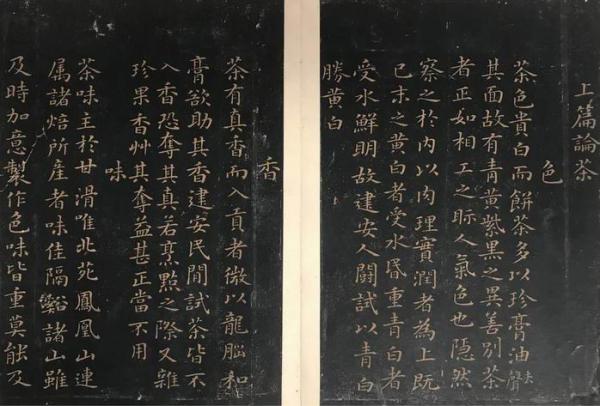
Cai Xiang regular script tea recording volume (partial) of the Northern Song Dynasty.
In the preface of "Tea Records", Cai Xiang stated his intention for writing this book, "In the past, Lu Yu's "Tea Classic" was not the product of Jian'an. I heard. "
Cai Xiang's "Tea Record" is not only a complete set of tea cooking and drinking process in the Song Dynasty, but also greatly improves the artistry of the act of drinking tea. When discussing the color of tea, he emphasizes the beauty of tea color and the relationship between distinguishing tea and knowing people ; On the fragrance of tea, he praised the original fragrance of tea and pursued the return to nature.
"Tea Record" is also Cai Xiang's rare lowercase masterpiece, and there is no tired writing in the whole article. Ouyang Xiu, who wrote the inscription and postscript for "Tea Record", said: "Those who are good at calligraphy find it difficult to use the real regular script, but the real regular script has small characters. ; "Tea Record" is strong and strict. Although the body is different, each is extremely second. Those who have learned the most, and the meaning of it, must create their essence. "
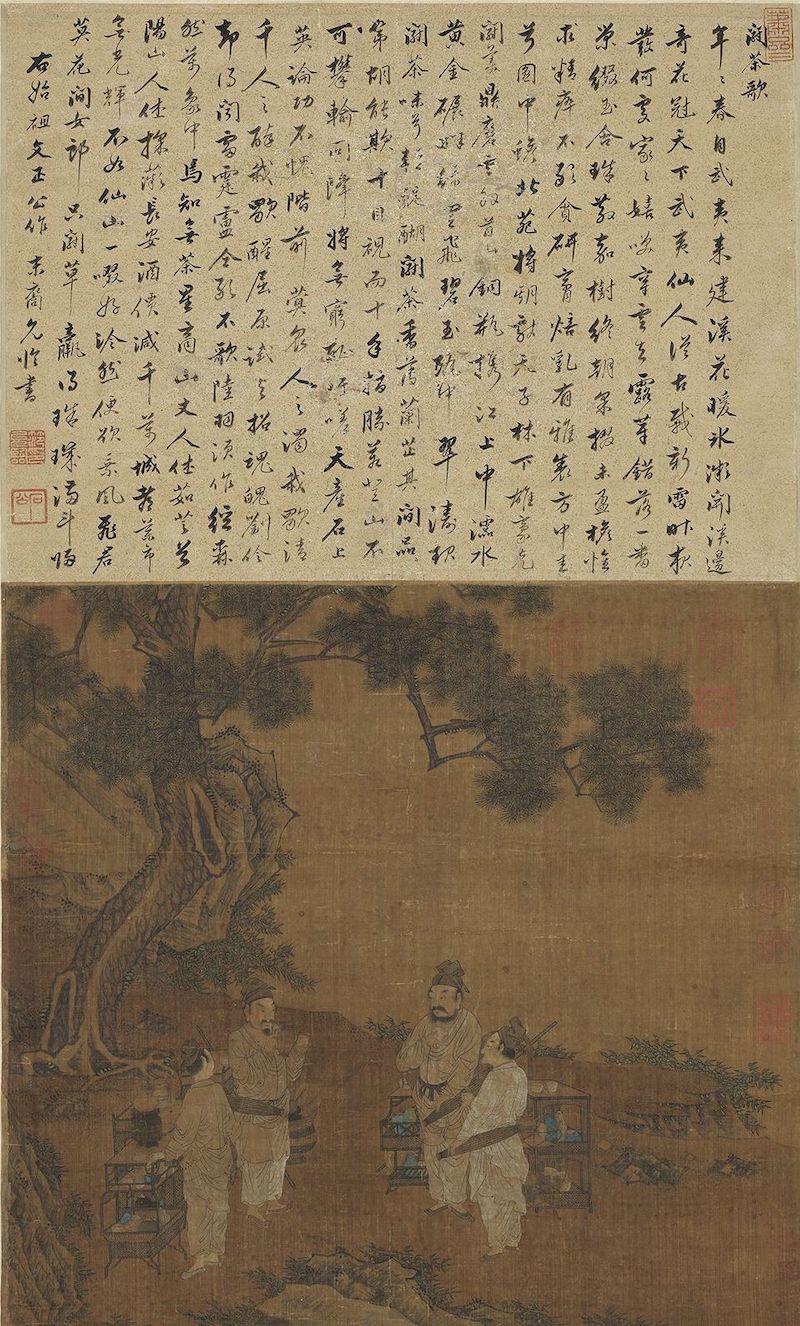
Song Dynasty Liu Songnian (pattern) Tea Fighting Scroll, Taipei National Palace Museum Collection
The rapid development of the tea industry and the praise of literati and bureaucrats made the art of tea tasting popular in the Song Dynasty. The coexistence of elegance and vulgarity became a prominent feature of the tea culture of the Song Dynasty. "Yanjia Pavilion" and "Jingtai" by the Wuqu River are the ruins of ancient tea fighting.
"Half of the country" Dahongpao
Known as the "treasure house of tea germplasm resources", Mount Wuyi is extremely rich in variety resources. In 1942, Lin Fuquan, an expert in tea science, found out that there are more than a thousand kinds of famous and single clusters in Wuyi Mountain. Dahongpao, Iron Arhat, White Cockscomb, Water Golden Turtle... Each Wuyi famous cluster has its own legendary story and origin, and "Dahongpao" is the most unique Langyuan fairy flower among them, and it is also the spokesperson of Wuyi rock tea.
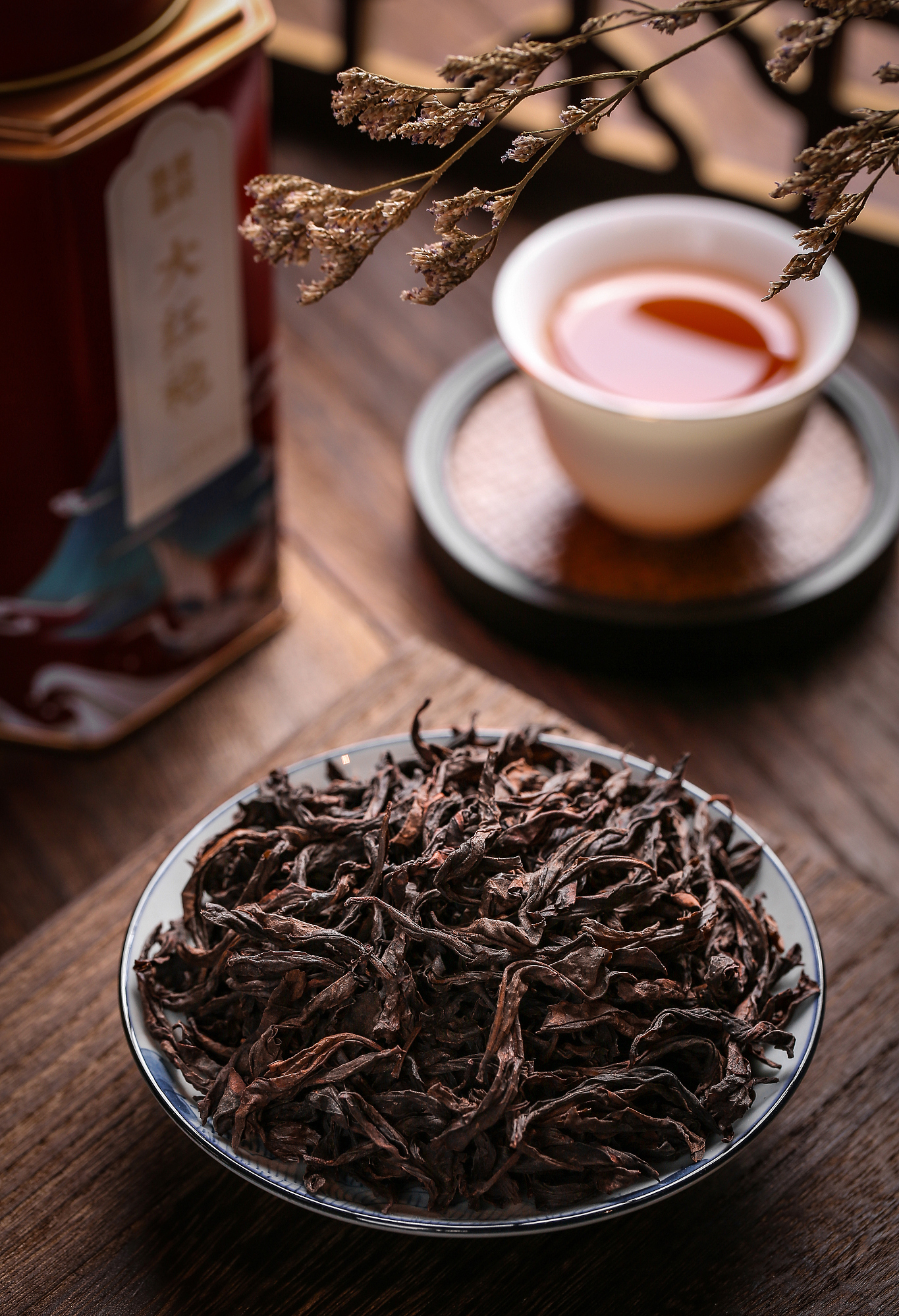
Wuyi Rock Tea Dahongpao
During the reign of Yongle, the important official Hu Wei visited Fujian and Zhejiang provinces in the early Ming Dynasty and stayed overnight at Tianxin Yongle Temple in Wuyi Mountain. Clouds and mist dispersed in the mountains and covered the Buddhist temple, and the moonlight shone on the living room. After drinking tea, Hu Wei wrote "Night Sleeping in Tianxin":
The Buddhist monastery is hidden by the Yunfu Mountains, where the moon surges and the heart of the sky shines through.
Under the shadow of the stone cold bamboo in the quiet path, is there any night in the red robe smell?
This is the earliest written record of Dahongpao found so far.
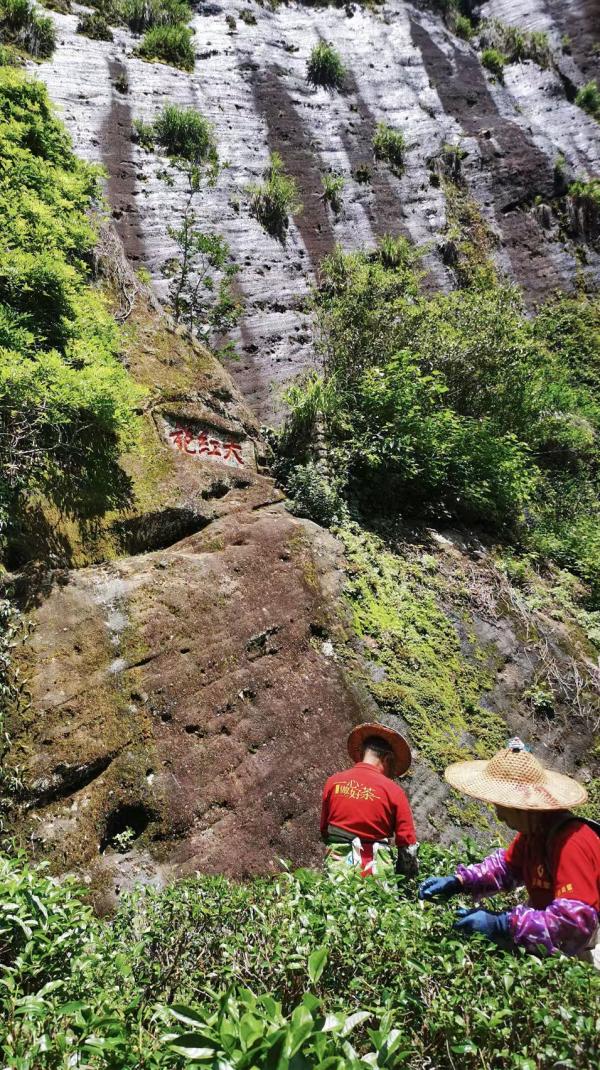
The stone carving of "Dahongpao" on the rock wall of Jiulongke, photo provided by Wuyixing
There are many allusions and legends about the name of Dahongpao, among which the most widely spread is "the theory of the number one scholar repaying kindness". According to legend, a son went to Beijing to take an exam and fell ill while passing Wuyi Mountain. Fortunately, he met a monk in Tianxin Temple and was rescued by the monk who used tea as medicine, and the scholar recovered. Later, he won the title of the scholar gold list and was the number one scholar in high school. Zhuangyuanlang returned to Wuyi Mountain to thank him, and the old abbot accompanied him to Jiulongke. The tea that was given to Zhuangyuanlang at the beginning was the tea tree picked on the rock wall of Jiulongke. I saw six tall tea trees growing on the rocks of the cliff, with luxuriant branches and leaves, and tender shoots. Then the abbot presented the roasted tea leaves to Zhuangyuan Lang.
After returning to Beijing, one day the Queen had abdominal distension and pain, Zhuangyuan Lang offered tea, the Queen drank it, and she recovered. When he arrived at Wuyi Mountain, Zhuangyuan Lang asked people to climb halfway up the mountain and put a big red robe on the tea tree to show the emperor's favor. Since then, people have called these tea trees "Dahongpao". "The theory of the champion repaying kindness" was originally recorded in the "Records of Tianxin Temple". Later, this temple record was lost in the flames of war, and this past story was passed down from generation to generation by the monks of Tianxin Temple. Today, the stone carving of "Dahongpao" made by the monks of Tianxin Temple in 1927 is still preserved on the rock wall.
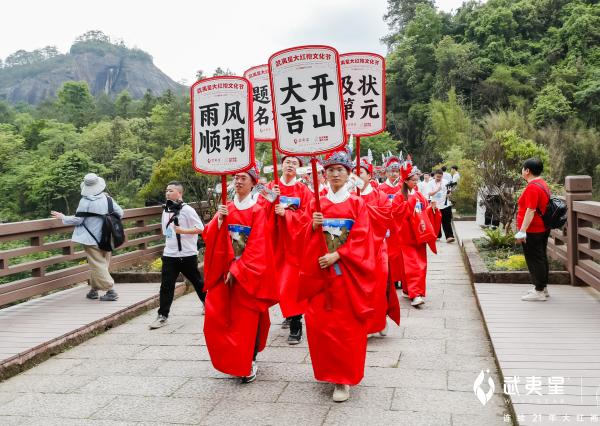
Today, the local tea masters in Wuyi Mountain also retain the custom of the number one scholar worshiping the mountain.
Although "Dahongpao" has the word "red" on it, it is not black tea, but an authentic oolong tea. The Wuyi rock tea that people are familiar with today matures relatively late among the six major teas, and is a semi-fermented "oolong tea". It not only retains the fragrance of green tea, but also has the mellowness of black tea. In the late Ming Dynasty, records of oolong tea craftsmanship appeared in the literature, and the craftsmanship tended to be stable during the Kangxi and Yongzheng years of the Qing Dynasty.
During the Daoguang period of the Qing Dynasty, the fourth volume of the encyclopedia "Yibanlu Miscellaneous" written by Zheng Guangzu wrote: " ... Ruomin real estate 'red robe' built a flag, and it has been popular in the world for fifty years . " The saying of "world" may be inferred that Dahongpao had become famous all over the world during the Qianlong period of the Qing Dynasty.
Before the promotion of asexual reproduction, the annual output of Jiulongnao Dahongpao was less than one catty. In 1972, when Nixon visited China, Mrs. Nixon wore a big red coat, and Chairman Mao presented four or two tea leaves from the mother plant of the red robe. Because Nixon didn't know that the mother plant of Dahongpao had a small yield and was extremely precious, he was still puzzled. Premier Zhou Enlai informed the origin of the Dahongpao, and explained: "The chairman has given away 'half of the country'." As a result, the Dahongpao has also left an impressive stroke in the diplomatic history of New China.
In 2007, the tea leaves picked from six Dahongpao trees on the rock wall of Jiulongke were collected by the National Museum. This is the last picking of the mother tree Dahongpao, and it is also the only modern tea collected by the National Museum. At that time, Jiang Fengyi, executive deputy curator of the National Museum of China, said: "The collections of the National Museum are all rare treasures, and there are very few existing ones in the world. Wuyi Mountain Dahongpao has a profound heritage, and the out-of-print mother tree Dahongpao tea in the collection is unique. It has become a Chinese tea. part of culture."